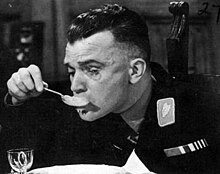|
The Silver Fleet
The Silver Fleet is a 1943 British World War II film written and directed by Vernon Sewell and Gordon Wellesley and produced by Powell and Pressburger under the banner of "The Archers". PlotEarly during the Second World War, the Nazis overrun the Netherlands and take control of a submarine shipyard where Jaap van Leyden is the chief engineer. The German Gestapo "Protector" Von Schiffer asks van Leyden to cooperate with the new regime. While pondering his decision, van Leyden walks by a grade school and overhears a teacher telling her class of pupils about Piet Hein, a hero of Dutch lore who captured the Spanish silver fleet and inspired his compatriots to continue fighting for freedom. Van Leyden then decides to accede to Von Schiffer's request. In doing so, he undertakes a covert campaign of sabotage against the German Occupation, leaving notes and graffiti signed under his nom de guerre, "Piet Hein". Thus, van Leyden discreetly enables 12 Dutch engineers to hijack a submarine during its trial run and sail it to England, along with its captured Nazi crew. Later, after construction of a second submarine is completed, van Leyden plants a bomb inside the sub's engine room, timed to go off the next morning. He returns home to host a dinner party where he persuades several high-ranking Nazi officials to accompany him on the submarine's maiden (and fatal) sea trial. However, his plans almost go awry when Dutch resistance fighter Bastiaan Peters, sneaks into Van Leyden's house undetected and threatens to shoot him as a Quisling. But Van Leyden convinces Peters he is actually "Piet Hein". Peters diverts any suspicion from van Leyden by fatally shooting himself, then hands the pistol over to van Leyden, thus protecting his "Piet Hein" identity. The next morning during its underwater trial, the second submarine is disabled when Van Leyden's planted bomb explodes and floods the engine room, dooming all aboard. Cast
ProductionSome scenes were filmed in the town of King's Lynn. According to Vernon Sewell, Gordon Wellesley "wanted to be a director and I said "No, co-director out! I won't have it. Only one director." So anyway, he had his name put on with me as 'written and directed by' but he wrote the script, he had nothing to do with doing direction in the movie at all."[1] ReceptionAccording to Vernon Sewell the film "made a fortune."[1] References
External links
|
||||||||||||||||||||||||||||
